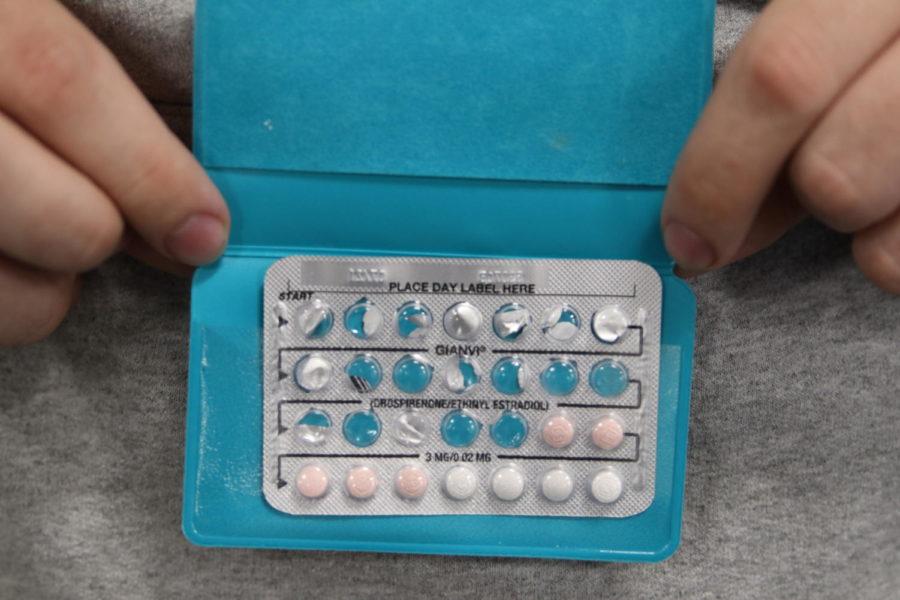Taking control of birth control
Chris Jorgensen/Iowa State Daily
birth control
March 7, 2019
Hannah Jensen, a junior in English, spent many years of her childhood dealing with the unnecessary symptoms associated with having her monthly period until she started using birth control.
According to a recent study published by the Center for Disease Control (CDC) in 2018, The second most common contraceptive method is the birth control pill. About 12.6 percent of women reported relying on the pill as contraception, but birth control pills are not only for pregnancy prevention. They also have the added benefit of suppressing a period.
For most women, monthly periods are either a minor inconvenience lasting for three to seven days or a weeklong event filled with acne, headaches, bloating and stomach cramps.
Jensen said the women in her family have a history with bad periods.
“There would be times in high school when I’d go home,” Jensen said. “I never really passed out, but I felt dizzy and I would get lightheaded.”
According to the Mayo Clinic website, it’s possible to prevent a period with continuous use of any birth control pill, although pill regiments have been designed to prevent bleeding for as long as up to a year.
Mary Raman, the Women’s Health Nurse Practitioner for Thielen Student Health Center, said one option is to take 84 consecutive pills, with a period every three months or take birth control pills that do not include placebo pills. She said there are many health benefits associated with period suppression for women who experience bad cramping or ovarian cysts.
Raman said birth control pills are meant to suppress ovulation for a certain amount of time. Each month women receive a package of 22 pills and four to seven placebo pills. The regular pills are taken for three weeks, while the placebo pills are meant to allow for the monthly period while staying on track with the daily regimen.
According to an article on Medical News Today, the placebo pills mimic the natural menstrual cycle but there is no real medical need for them. People usually get their period while taking the placebo pills because the body reacts to the drop-in hormone levels by shedding the uterine lining.
“Placebo pills goes back to the historical artifact of when they were first introduced in the 1960s,” Raman said. “The idea behind it was to make them as well accepted as possible for women and to show that they were natural and would not harm fertility.”
Raman said birth control pills will only affect fertility while it’s being taken.
Kamryn Tegrootenhuis, a sophomore in elementary education, said she knows very little about birth control and women’s health.
“I’m super feminist forward and I believe that you should have the right to birth control if you want it,” Tegrootenhuis said. “And I feel like there is more science behind things now. Why aren’t we putting more science into these, instead of the 1960s.”
Taking birth control continuously is meant to suppress a period, but it won’t always stop all of the bleeding.
“Suppression of periods vary from woman to woman,” Raman said. “Some women may experience breakthrough bleeding.”
Breakthrough bleeding is spotting or bleeding from the uterus occurring between menstrual periods. Breakthrough bleeding can occur with any birth control pill, especially during the first few months of use.
According to the Mayo Clinic website, breakthrough bleeding is more likely with continuous and extended cycle regimens than with the traditional 28-day schedule.
“Breakthrough bleeding can also occur when taking normal 28-day birth control pills in a continuous manner,” according to the website.
It may simply take time for your body to adjust to the hormones in the pill or for your uterus to transition to a thinner lining.
“With continual use, this could stop, and the suppression can last longer and longer,” Raman said.
If women want more information about birth control options and period suppression, they can visit Bedsider.org, a Thielen Student Health Center approved website or contact Thielen Student Health Center directly.
“I didn’t know that you could potentially stop your period,” Jensen said. “This is making me realize how little I know. I should know more and be more educated on this.”
















